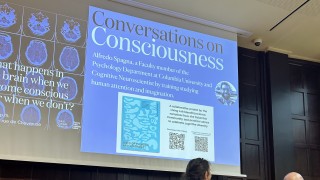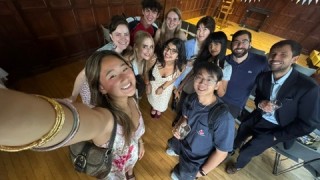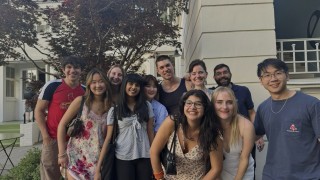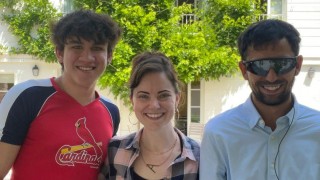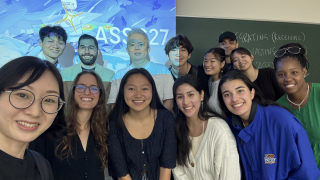Please note that the Columbia Summer Program: Global Neuroscience will not run during the Summer 2026 semester. Please register your interest in the field above to receive updates about the program in the future.
The Columbia Summer Program: Global Neuroscience introduces one of the leading topics in the sciences– understanding the connection between the mind and the brain and how it impacts thoughts, perceptions, and behavior. By taking a deeper dive into the basics of neuropsychology, consciousness, and its application in real-world situations, you will:
• Understand the Scientific Method: Develop the foundations of scientific knowledge and the fundamentals of scientific inquiry.
• Learn Beyond the Classroom: Be exposed to cutting-edge research through curated lectures, discussions, and lab visits.
• Expand Your Horizons: Cultivate intercultural competencies, acquire skills in critical thinking, and deepen your self-awareness while engaging with global perspectives.
The program will take place in Paris, France, in Summer 2025.
Eligibility and Application
Eligibility
Open to currently enrolled undergraduates from Columbia, Barnard, and other universities.
Applicants should have basic knowledge of the nervous system and have completed some coursework in one of the following departments: Psychology (including PSYC UN1001 The Science of Psychology or an equivalent introductory course in psychology), Neuroscience, Biology, OR possess a strong computational and statistical background (e.g., Computer Science, Statistics Departments).
Applicants must meet the basic requirements for studying abroad: a 3.0 cumulative GPA, a 3.0 GPA during the semester before going abroad, and good academic and disciplinary standing at their home school.
How to apply?
Want to apply? Click the “Start Your Application" button at the top of this page. If the button doesn't appear above, the program is not yet accepting applications. You will be asked to set up a short profile, which will allow us to send you relevant information about your application. Once you’ve created a profile, you will see a checklist of items that you will need to submit. These generally include:
- Application questionnaire(s)
- Personal statement
- Official transcript(s)
- Resume
- Academic Recommendation
- An interview may be requested
- Home School Approval/Clearance: If applying from another university, please check with your home university's study abroad office about applying for permission to attend the program and to transfer the credit.
- Application fee (if applying from another university)
Academics
Students will take two 3-point courses on this program: Fundamentals of Neuropsychology with Alfredo Spagna and Hallucinations: Case Studies in Interdisciplinary Research with Luca Iemi.
PSYC2471OC: Fundamentals of Neuropsychology (link to syllabus), 3 points
Instructor Alfredo Spagna, Department of Psychology, Columbia University
This course has been approved to partially fulfill the Columbia College Core Curriculum Science Requirement and the General Studies Core Science Requirement.
This course has been approved by Columbia's Department of Psychology to fulfill either the P2 (Intro to Neuro) or the P4 (another Lecture in Psychology) requirements toward a major or concentration in Psychology or Neuroscience & Behavior.
This course explores how the analysis of lesion patterns extended across brain networks has offered invaluable insights on the relationship between brain and behavior and deepened our understanding of the causal relationships between brain lesions and their clinical consequences.
PSYC2472OC: Hallucinations: Case Studies in Interdisciplinary Research (link to syllabus), 3 credits
Instructor Luca Iemi, Department of Neuroscience & Behavior, Barnard College
Pending approval by the Committee on Instruction and the Committee on Science Instruction to partially fulfill the Columbia College Core Curriculum Science Requirement and the General Studies Core Science Requirement.
This course has been approved by Columbia's Department of Psychology to fulfill either the Group 2 or the P4 (another Lecture in Psychology) requirements toward a major or concentration in Psychology or Neuroscience & Behavior.
This course examines the phenomenon of hallucinations, in which the brain creates perceptual experiences that do not correspond to external sensory input. To explore this phenomenon, students will engage with a variety of media—such as podcasts, documentaries, and memoirs—alongside scholarly articles from fields like cognitive neuroscience, psychology, psychiatry, and anthropology. Drawing on case studies centered on the lived experience of hallucinations, we will investigate how key theories of the mind and brain influence the interpretation of first-person accounts and how, in turn, these accounts challenge and refine these theories.
Note: The University reserves the right to withdraw or modify the courses of instruction or to change the instructors as may become necessary.
PROGRAM DATES
The program will be intensive and students should expect to devote much of their time to their classes, coursework, and attending the specially planned co-curricular and extra-curricular activities. A more detailed schedule will be provided at a later date.
| Information | Date |
| Student Arrival and Housing Check-In | Wednesday, May 21st, 2025 |
| Orientation | Thursday, May 22nd, 2025 |
| First Day of Classes | Friday, May 23rd, 2025 |
| Last Day of Classes | Wednesday, June 18th, 2025 |
| Student Departure and Housing Check-Out at 10:00 AM | Thursday, June 19th, 2025 |
All students are required to attend the orientation, which will provide an introduction to life in Paris and other important information. Program housing is not available outside of the program dates.
GRADES AND TRANSCRIPTS
GRADING POLICY
Click here for the Columbia summer program grading policies.
TRANSCRIPTS
Upon successful completion of the program, grades are entered into Columbia's online grading system.
Credit is not granted to students who do not complete the full program.
All courses taken on the program are converted to an American grading scale and transmitted to students as follows:
- Columbia Students: Grades appear on SSOL and your transcript as semester grades from courses taken at Columbia. For more information, please see the section on Academic Credit in Steps to Study Abroad.
- Barnard Students: Grades appear on eBear and your transcript as any semester grades from courses taken at Barnard. For more information, please see the section on Credit and Transcripts for Barnard Students on our Barnard student pages.
- Non-Columbia Students: You can request electronic transcripts online through Columbia's Office of the University Registrar.
Life in Paris
Housing
Students will live in single-furnished rooms with access to a private bathroom, shared kitchenette, and laundry facilities or in furnished studio-style apartments with their own kitchenette.
Housing is located with easy access to transportation and approximately a 30-minute commute (on the métro) from Columbia Global Centers | Paris at Reid Hall.
Daily Living and Schedule
The program has many course-related activities, as well as a few social events, that will help students engage with the cultural life of Paris. Past social and cultural activities have included theater workshops, pottery, crépe-making, wine tasting, and excursions around Paris. You will have adequate time to explore Paris on your own and to soak up the ambiance of the city Paris in the summer.
In addition, the Columbia Global Center | Paris has many activities throughout the summer that are open to students on the program at no charge.
Location
The home base of Columbia University in Paris is the Columbia Global Centers | Paris at Reid Hall, where all of your classes will take place. Reid Hall is a small group of buildings owned and administered by Columbia. It also serves as an educational center for other American universities and for scholars from around the world. For more than a century, its long and distinguished past of intellectual, artistic, and cultural exchange has made it significant for the relationship between France and the United States.
Reid Hall, constructed in the early 18th century before the French Revolution, is located in the lively Montparnasse (6th arrondissement) district of Paris, near the Luxembourg Gardens and within walking distance of the Latin Quarter and several branches of the University of Paris. Modern additions have enlarged the facility, creating an interior courtyard and private garden. Reid Hall primarily houses administrative offices and classrooms and also has a small reference library, a reading room, lounges, a multimedia lab, and two large conference rooms. Students have access to WiFi in all common areas of Reid Hall.
People
Columbia Global Centers | Paris
The faculty and program are supported by the staff of the Columbia Undergraduate Programs in Paris and the Columbia Global Centers | Paris. You will be introduced to the Columbia Undergraduate Program staff during the orientation.
Faculty
Program Director and Instructor: Alfredo Spagna
Alfredo Spagna, is a Faculty of the Psychology Department and the Director of Undergraduate Studies for the Neuroscience and Behavior Major. He teaches a variety of lecture and seminar courses for the Psychology Department, including Behavioral Neuroscience (UN2450), Human Neuropsychology (UN2470), Attention and Perception seminar (GU4229), Consciousness and Attention seminar (GU4225), and a newly created Human Neuroimaging Course (GU4990) that will be delivered starting Fall 2020. His research interests span across different but related fields, including attention, perception, consciousness, and visual mental imagery, and mainly on healthy adults. His involvement in international and national research grants is at the core of the program since enrollees will be visiting the labs in which the Program Director's international research collaboration is ongoing.
Program Director and Instructor: Luca Iemi
Luca Iemi joined the Department of Neuroscience and Behavior at Barnard College in 2022 as a Term Assistant Professor. His expertise is in the fields of cognitive neuroscience, electrophysiology, and perceptual decision-making. His research seeks to understand how perception and behavior are influenced by spontaneous brain activity, with a particular focus on neural oscillations.
Graduate Program Coordinator: TBD
Financial Considerations
Summer 2025 Tuition and Fees*
Please see our cost breakdown for detailed information.
*Tuition and fees are subject to the Board of Trustees' approval and may change.
Financial aid and scholarships
If you receive financial aid during the academic year, you may remain eligible for financial aid when you attend a summer Columbia-Led Program as long as you take a minimum of 6 points.
CC/SEAS: Contact the CC/SEAS Financial Aid & Educational Planning to understand if any of your federal financial aid may cover enrollment costs for a summer program. Please note the Columbia Grant is not available for summer studies.
General Studies: Contact the GS Office of Educational Financing to understand if any of your financial aid may cover participation in a summer program.
Other students should contact their home school financial aid offices.
For more general information and resources on financing your time abroad, please see the pages below:
GLOBAL LEARNING SCHOLARSHIP
The Center for Undergraduate Global Engagement (UGE) offers the Global Learning Scholarship (GLS) to support Columbia students so they may enhance their undergraduate education by participating in a summer global learning opportunity.
Eligibility:
You are eligible for the Global Learning Scholarships (GLS) if you are:
A Columbia College, Columbia Engineering, or General Studies student who demonstrates financial need
All other students are not eligible for the GLS
Application and Timeline:
Students apply for the Global Learning Scholarship (GLS) and the Columbia-Led summer program with two separate applications.
Scholarship applications are due: February 14th, 2025 (closes at 11:59 pm EST)
GLS applicants must also submit a completed program application by the program application deadline OR no later than the following: February 14th, 2025 (closes at 11:59 pm EST)
To apply to the Global Learning Scholarship, please click here.
OTHER SCHOLARSHIPS
For a list of other scholarships specific to study abroad, please visit the Scholarships for Study Abroad for more information. Of note are the:
Withdrawal Policy
To learn about the financial consequences of withdrawing from the program, please review the Summer Withdrawal and Refund Policy here.
Find Out More
After being accepted to the program, we will share information and email communications regarding the next steps. We understand that there will be a lot of steps to complete, so please utilize the resources below to help you get started:
Speak to an Adviser: Want to learn more? Make an appointment to chat with the adviser for this program! You can also email them with any questions or to arrange a meeting if you are unable to make the listed times.
Applying: Make sure to review the dates and deadlines section at the bottom of the page.
Resources: View our Steps to Study Abroad page to see advice on Where to Begin, how to Prepare to Go, and what you need to know when Returning from Abroad. We will share many resources with you throughout the application and pre-departure process for preparing to study abroad.
We recommend reviewing the following before you apply:
Having a valid passport is one of the key components of going abroad. See more on our Passports and Visas page.
Need help deciding which semester, program, and experience are right for you? Check out our Choosing a Study Abroad Program page.
Learn about finances and study abroad on our Financial Considerations page.
If considering summer study abroad, review guidance on our Summer Study Abroad page.
Plan ahead and prepare for your health, well-being, and accessibility abroad by reviewing our Well-Being Abroad resources and Identity and Diversity Abroad page.
Once accepted, make sure to review the Prepare to Go page for more resources and information about preparing for your experience abroad.
